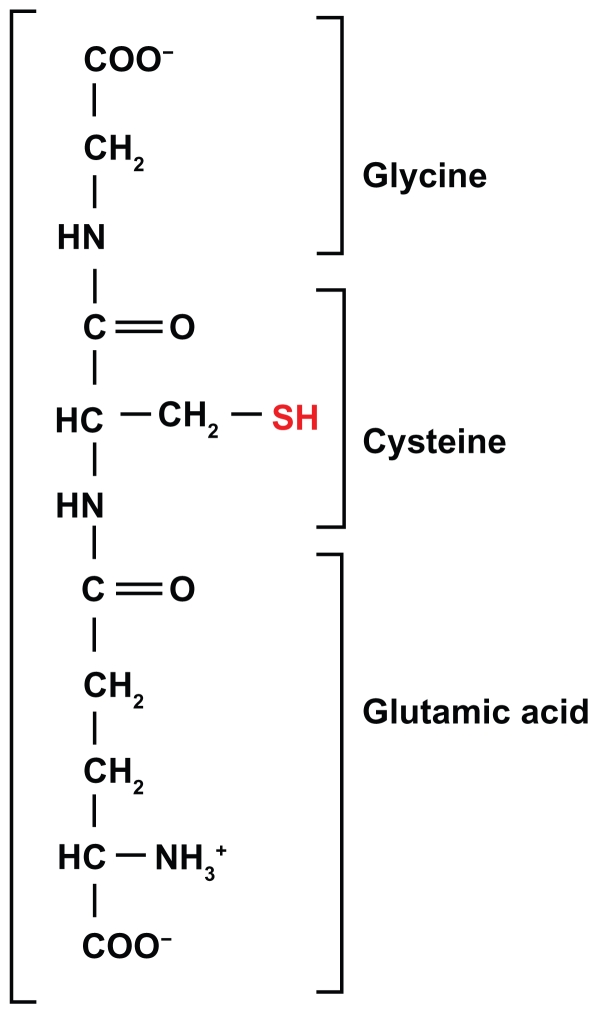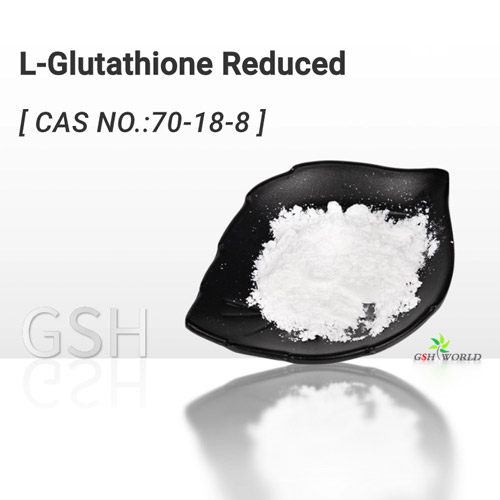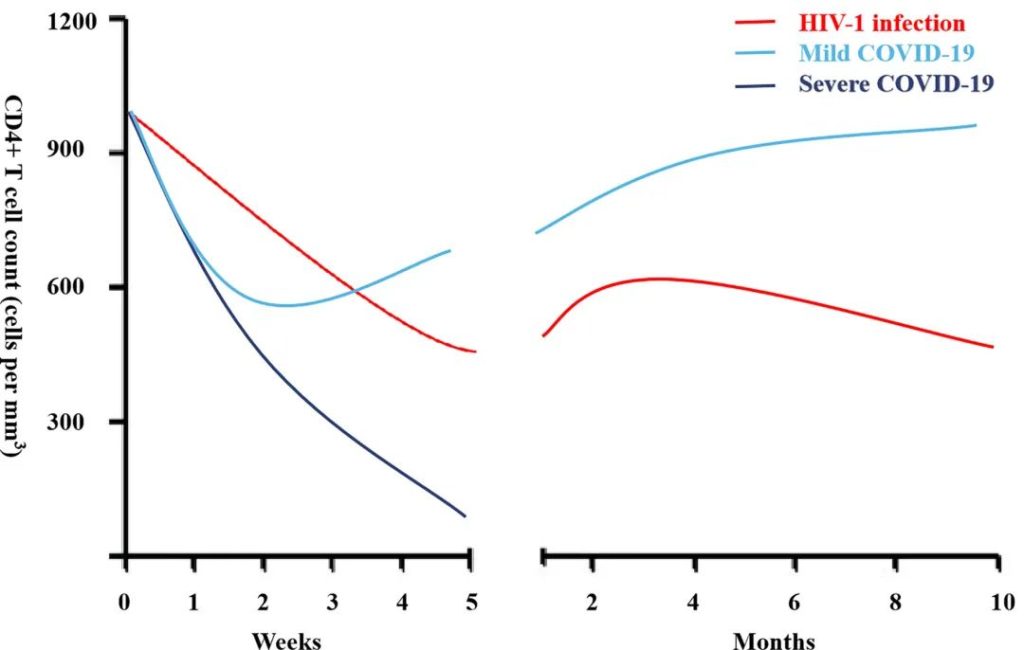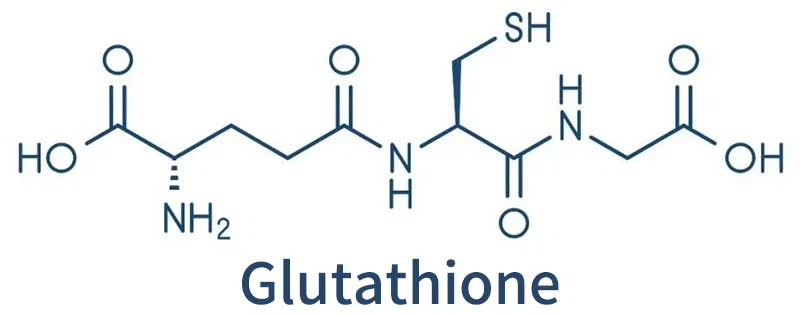To explain the importance of cysteine, we have to start with glutathione.
Glutathione: an important antioxidant
Glutathione is a tripeptide synthesized from glutamic acid, glycine and cysteine, which is an important antioxidant continuously produced by the human body.

In the human body, the content of glutathione is extremely rich, there are 5 ~ 10mM in the cell – and cholesterol, glucose, potassium concentration is comparable, can be considered one of the most powerful compounds in the body.
Even if it takes a lot of energy and nutrients (Glutathione Factory) to make this much glutathione, it must be very useful.
Indeed, as an antioxidant, glutathione can eliminate free radicals, reduce oxidative stress, reduce oxidized vitamins C and E, and thereby maintain cell function and improve cell energy – muscle contraction also needs glutathione support.
Glutathione is not only an antioxidant, but also widely involved in other physiological mechanisms, especially in immune function plays a number of roles.
Glutathione in the immune system
In innate immunity, GSH can promote the proliferation of T lymphocytes, enhance the phagocytosis activity of granulocytes, and support the function of dendritic cells.
Glutathione also regulates the inflammatory response of innate immunity – neutralizing reactive oxygen species clusters, inhibiting the production of most inflammatory factors (and thus reducing inflammation), and participating in the production of gamma interferons in dendritic cells.

In adaptive immunity, or acquired immunity, glutathione is also key:
The antigen has to be broken down into smaller peptides before it can be presented to the adaptive immune system to design and produce antibodies – and to break down the antigen, the disulfide bond has to be broken, which requires glutathione.
Not to mention, the immune system, both innate and acquired, is also under a lot of oxidative stress at work, which itself requires a lot of glutathione to come to the rescue.
Depletion of glutathione and decreased immunity
As a result, glutathione levels in the body quickly deplete when a person is ill – as seen in influenza, tuberculosis and sepsis.
The decline in glutathione levels, in turn, will weaken the body’s immunity, making people susceptible to various pathogens…
When it comes to weakening the immune system, the HIV virus is naturally responsible – studies have found that people with “acquired immune deficiency syndrome” have extremely low levels of glutathione in their lymphocytes.
The main constraint on the body’s ability to make glutathione is the level of cysteine – glutamate and glycine are less scarce.
On the contrary, high glutamate levels will prevent cysteine from entering the cell, and thus reduce the low level of tathione.
Because of the need to synthesize glutathione, HIV patients lose about 4 grams of cysteine per day.
Therefore, if AIDS patients are supplemented with n-acetylcysteine (NAC), they can significantly improve their immunity and even completely restore the activity of their natural killer cells.
N-acetylcysteine is a precursor of cysteine and can penetrate the cell membrane more easily than cysteine.

Cysteine supplementation after COVID-19 infection
In this way, if you refer to the high consumption of cysteine in AIDS patients, people with COVID-19 may also need to supplement the body with the same level, that is, 4 grams of cysteine per day – at least for the first 4 weeks.
Foods rich in cysteine are mainly various animal foods, especially internal organs, such as chicken liver, pig liver, beef liver, beef loin, and eggs, the content is more than 300mg/100g, and the content of various pork, lamb, beef, rabbit, chicken, fish, shrimp, is about 250mg/100g, if you eat one kilogram of meat every day, Can ensure intake of more than 1 gram of cysteine.
Four grams of cysteine, which translates to about 5.5 grams of n-acetylcysteine.
In this way, it should be able to provide adequate nutritional support to the immune system, reduce body inflammation, accelerate the fight against the virus, and greatly alleviate the damage of the new coronavirus on the immune system.
Fatigue after infection
Finally, as mentioned earlier, glutathione is also required for aerobic muscle contraction. But when the body is faced with an infection, this need is obviously not as urgent as the need for immunity.
When sick, the immune system draws a lot of cysteine (mainly in the form of NAC) from muscle tissue – which partly explains why illness is often accompanied by fatigue.
On the other hand, during a lot of exercise, muscle tissue will also withdraw cysteine from the immune system, so after excessive exercise, immunity will have a temporary decline.
If you have significant and persistent fatigue problems after COVID-19 infection, you should also consider taking a large supplement of cysteine to support muscle tissue in addition to the immune system.
References:
- Aoi, W., Ogaya, Y., Takami, M., Konishi, T., Sauchi, Y., Park, E. Y., Wada, S., Sato, K., & Higashi, A. (2015). Glutathione supplementation suppresses muscle fatigue induced by prolonged exercise via improved aerobic metabolism. Journal of the International Society of Sports Nutrition, 12, 7. https://doi.org/10.1186/s12970-015-0067-x
- Pizzorno J. (2014). Glutathione!. Integrative medicine (Encinitas, Calif.), 13(1), 8–12.
- Ghezzi P. (2011). Role of glutathione in immunity and inflammation in the lung. International journal of general medicine, 4, 105–113. https://doi.org/10.2147/IJGM.S15618
- Dröge, W., & Breitkreutz, R. (2000). Glutathione and immune function. The Proceedings of the Nutrition Society, 59(4), 595–600. https://doi.org/10.1017/s0029665100000847
- Dröge W. (1993). Cysteine and glutathione deficiency in AIDS patients: a rationale for the treatment with N-acetyl-cysteine. Pharmacology, 46(2), 61–65. https://doi.org/10.1159/000139029
- Bounous, G., & Molson, J. (1999). Competition for glutathione precursors between the immune system and the skeletal muscle: pathogenesis of chronic fatigue syndrome. Medical hypotheses, 53(4), 347–349.
- Peng, X., Ouyang, J., Isnard, S., Lin, J., Fombuena, B., Zhu, B., & Routy, J. P. (2020). Sharing CD4+ T Cell Loss: When COVID-19 and HIV Collide on Immune System. Frontiers in immunology, 11, 596631.




